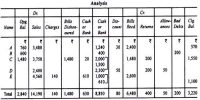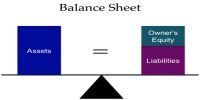Trial balance is a list of accounts and their balances at a given time. The trial balance is made with the final balances of the ledger and if the totals of both sides of trial balance are equal then it indicates that the totaling and balancing of the accounts are completely correct.
Limitations of a Trial Balance
A trial balance has some disadvantages. Such of them are as follows:
- It does not prove that all transactions have been recorded. It does not prove that the ledger is correct.
- Numerous errors may exist even though the trial balance columns agree.
- It cannot find the missing entry from the journal. A transaction that is totally missing, was not even journalized, it does not prove that all transactions have been recorded.
- Cannot find the missing entry from the ledger. When the wrong amount was written in both the accounts, it does not prove that the ledger is correct.
- It cannot protect the repeated postings. If a posting was done in the wrong account but in the right amount, it cannot protect the repeated postings.
- An entry that was never posted in the ledger altogether, it cannot find the missing entry from the journal.
- Double posting of entry by mistake, numerous errors may exist even though the trial balance columns agree.
- It cannot protect the offsetting errors. It gives only condensed information about each account.
- Cannot protect the errors of principles. It is not conclusive proof of the accuracy of posting.
- It cannot protect the errors of commission. Debit and credit balance will continue unchanged in-case if the transaction is posted to incorrect account but of similar types.
- It cannot protect the errors of omission. It will not be competent to locate inaccuracy in-case if any of the transaction is omitted.
In short, a trial balance does not guarantee freedom from recording errors.
There are few types of clerical errors; errors that are made by a human.
- It cannot defend the errors of principles, and an error of principle indicates error because a principle of accounting is not applied properly. Accountants and auditors should never take it as granted that there is no error after the agreement of trial balance, i.e., a trial balance should not be taken as last evidence of correctness.
- It cannot guard the errors of omission, if the omission is made in reorganization only one part of journal entry or omission is made in posting the total of the supplementary books to ledger accounts or the total of ledger accounts to trial balance itself, the error will be detected. If the totals of debit and credit money columns of trial balance are similar it is assumed that the accounting procedure is correct.
- An error of Compensation: When the accountant makes a surplus debit or surplus credit entry although the similar being neutralized by excess credit or surplus debit correspondingly in the similar or another account, such error is recognized as error of compensation.
But the agreement of both debit and credit money columns of the trial balance does not essentially prove that there is no error in the accounting procedure. Because there might have several undetected errors although the agreement of trial balances.















